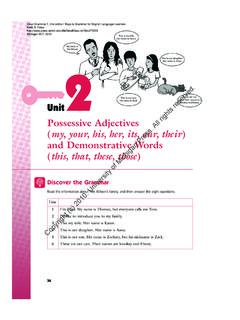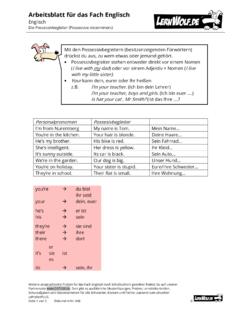Possessive Pronoun
Found 9 free book(s)learnenglishfeelgood.com ESL RESOURCES POSSESSIVE …
www.learnenglishfeelgood.comtopic: POSSESSIVE PRONOUN or POSSESSIVE ADJECTIVE? 2 Choose whether each sentence requires a possessive adjective or a possessive pronoun: EX: That car is not his. It's mine. (possessive pronoun) OR That's my car. (possessive adjective) 1. Is that your notebook or _____ (my/mine)? 2.
Plural vs. Possessive ‘S’ - University of Manitoba
www.umanitoba.caThe most complicated possessive pronoun is its . Its and it’s do not serve the same grammatical function. It’s is a contraction for it is and its is the possessive pronoun that signifies belonging to it. Check if you’re using it’s correctly by asking yourself whether you could replace it’s with it is and
GRAMMAR PERSONAL PRONOUNS noun. I, you, he, she, it, …
www.montana.eduThe form/case of the pronoun must reflect how it functions in the sentence. If the pronoun acts as the subject it takes the nominative form/case. If the pronoun acts as the object, it takes the objective form/case. If the pronoun reflects ownership, it takes the possessive form /case. PRONOUN FORMS AND CASES
Unit rights - University of Michigan Press
www.press.umich.eduPossessive adjectives occur before a noun (my car)or an adjective + noun (my new car). Rule 3. Possessive adjectives have no singular or plural. They are used with both singular and plural nouns (my book, my books). BE CAREFUL! Comparing Subject Pronouns and Possessive Adjectives Subject Pronouns Possessive Adjectives IIplay tennis. my This is ...
WRITING CENTER - University of Houston–Clear Lake
www.uhcl.eduare also plural possessive. We need to discuss pronouns. We can use a pronoun in place of a noun. Pronouns refer to the noun you’re talking about. For example: I, he, she, you, it, we, and they. But be careful because the subject of a sentence is clearer if you use a specific noun at the front of your sentence.
Possessive Contraction Pronoun Adverb is it's its you are ...
www.lamission.eduPossessive Contraction Pronoun Adverb it + is = it's its you +are = you're your he = is = he's his they + are = they're their there who + is = who's whose Please select theproper word. l. The dog ate (it's, its) dinner. 2. (It' s, Its) going to rain tomorrow. 3. The team elected (it's, its) captain. 4. The man said that (it's, its) too hot to ...
adjectives - Southeastern Louisiana University
www.southeastern.eduAn adjective modifies a noun or pronoun by providing descriptive or specific detail. Unlike adverbs, adjectives do not modify verbs, other adjectives, or adverbs. Adjectives usually precede the noun or pronoun they modify. Adjectives do not have to agree in number or gender with the nouns they describe.
Arbeitsblatt für das Fach Englisch - lernwolf.de
www.lernwolf.deDie Possessivbegleiter (Possessive determiners) Setze die passenden Possessivbegleiter ein! (Put in a possessive determiner - my, your, his, her, its, our, their-). D She’s my best friend. He r name is Becky. D Your cat is nice, Sarah. D They are the Millers. That’s their house. D The monster is over there. But my / its friends are here.
Pronoun and Antecedent Agreement - Lone Star College …
www.lonestar.eduPronoun and Antecedent Agreement Pronouns are words that take the place of nouns. The antecedent of a pronoun is the word to which the pronoun refers. The pronoun and its antecedent agree in gender and number. Jane called her friend. Jane and her are both singular and feminine. John called his friend. John and his are both singular and masculine.








